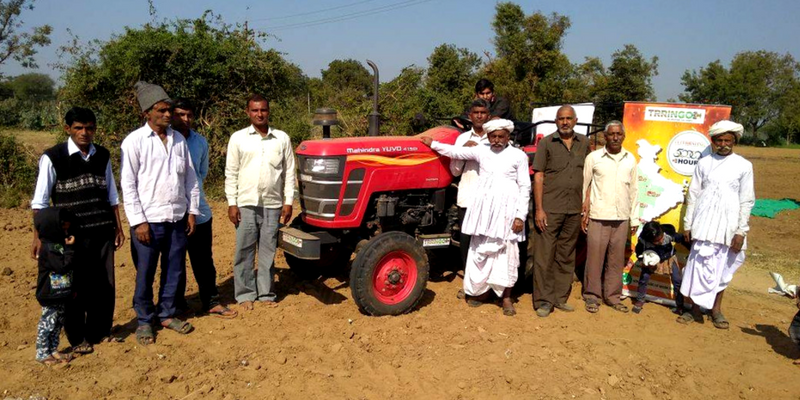Agri startups are bringing in IoT, BigData and equipment to farmers and revolutionising the sector
Using the sharing economy model, these agri startups are combining efficient re-inventions with tech-driven innovations to make agriculture a profitable profession for Indian farmers.
In India, around 75 per cent of farmers own less than one hectare of land. The small landholdings make it unviable for farmers to own agri-machinery and implements like tractors, tillers, rotavators etc. A possible solution could be to rent out machinery, but that seems impossible because of their limited access.
Not only do farmers face many challenges while seeking to rent agri-machinery, they also face price exploitation and unreliable delivery schemes, resulting in lower yields and crop loss.
To counter this problem, many agri startups have adopted the sharing economy model, called Farming as a Service (FaaS), where farmers can rent machinery as per demand. Similar to the Ola and Uber services in the market for public transportation, practitioners believe the solutions offered by this model have the ability to revolutionise the agriculture sector in India.
These practices bring together a mix of organised and efficient re-inventions, combined with tech-driven innovations. We list down a few agri-startups that are pioneering this sharing economy model.
1. Gold Farm
Serial entrepreneur Abhilash Thirupathy, who founded Surya Power Magic in 2012 and was involved in solar pump irrigation, was aware that people were moving out of agriculture due to lack of empowerment. Present-generation farmers were moving away from the profession due to the hardships involved, coupled with the lack of income and equipment.
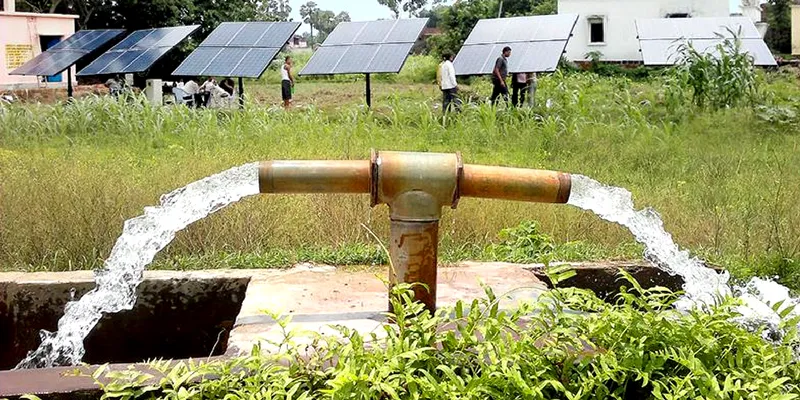
Abhilash wanted to change this and make the agri-sector a profitable profession. In 2016, he started Gold Farm. From a two-person startup, it has now grown to a 100-people company. Their aim is to provide farmers with products and services through a convenient platform and have a positive impact on their lives.
Moving from a single product company (solar water pumps) to a digital platform for agri products and services, Gold Farms is on a mission to help double farmers’ income.
Through mobile application and a call service, the startup provides easy accessibility of booking farm equipment. They work closely with the government and farm equipment manufacturers to make farm mechanisation affordable to small and marginal farmers.
Till date, the organisation has touched the lives of thousands of farmers across India by converting over 7,500 hectares of barren land into cultivable land.
2. Oxen Farm Solutions
Founded in 2016, Vishwaeet Sinha started Oxen Farm Solutions with the aim to bring innovative and enabling technology solutions to farmers.
“We started with Maharashtra as a market and the idea of providing multi-service walking tractors to smallholders. While experimenting with different models, equipment and geographies, we fell in love with harvesting services,” Vishwajeet recalls.
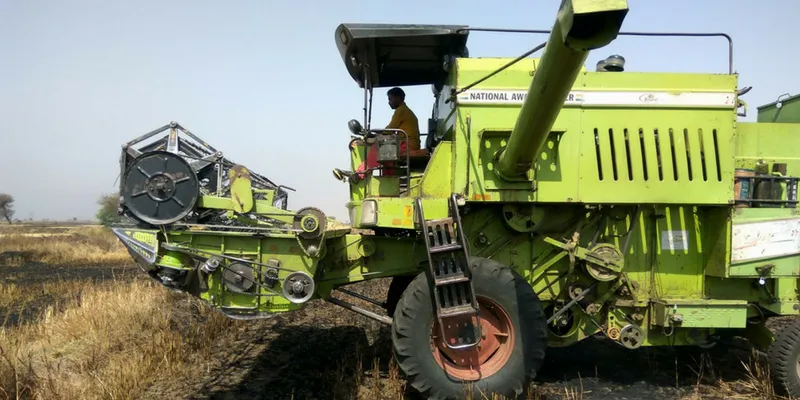
Oxen aims to revolutionise farming through farm mechanisation by providing access to advanced technologies in a tech-enabled, efficient, and pay-per-use model. They provide equipment for a range of services including crop residue management, land preparation, planting, crop management, harvesting, and post-harvest processing.
Oxen is using IoT to gather information from sensors in machinery and generating valuable data on machinery performance. It uses satellite imagery and big data analysis to analyse crop health, crop progress, and harvesting status. They use mobile enabled solutions to capture crop data to assist the farmer in harvesting the right crop suitable for that land.
The startup raised funds and was incubated by IIT Kanpur; later it even collaborated with former President Pranab Mukherjee Foundation.
3. farMart
During one of his routine visits to Jallandar, Punjab, Alekh Sanghera heard his 88-year-old grandfather talk about the hardships farmers face and how farming is no longer a respectable and profitable business in India. To solve this problem, the two 24-year-olds, Alekh, and Mehtab Singh Hans, along with their mentor Lokesh Singh, founded farMart.
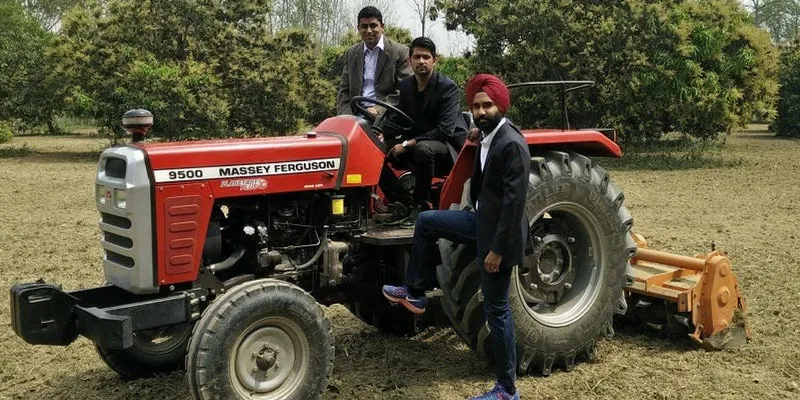
farMart connects farmers who own machinery with those who don't. Large farmers put underutilised agri-machinery up for rent on the farMart platform and farmers who are in need of machinery can book it using a mobile app or call centre.
On-boarding multiple machinery owners and helping them generate an alternative source of income, farMart provides access to a larger customer base of farmers by leveraging the existing market supply of machinery rather than investing in procuring machinery, therefore making the model highly scalable. They reach out to farmers by organising roadshows, self-help groups, and through gram panchayats.
Till date, they have covered 300-plus villages and have over 1,500 farmers on their platform.
4. Trringo
India’s largest tractor maker company, Mahindra and Mahindra Ltd, in 2016 launched Trringo to rent farm equipment to farmers across India. With Trringo, the company aims to raise the level of mechanisation in farming through the power of technology and a strong franchisee network, enabling farmers easy access to tractors at an affordable price.
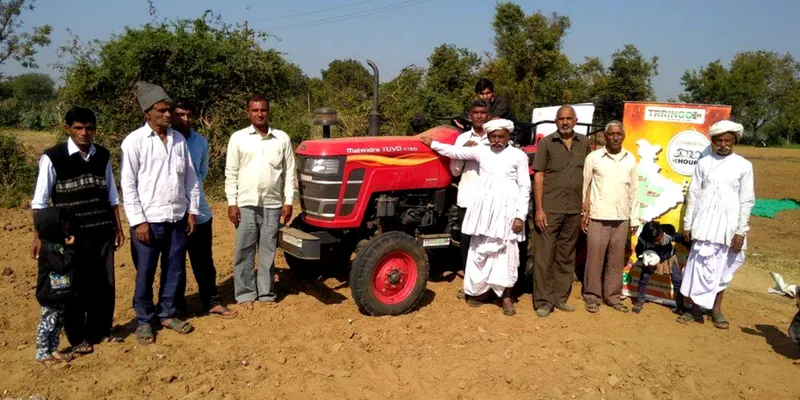
“Small farmers ask for tractors from the few who own them, leading to uncertainty, compromise on quality of tractors or equipment, and, often, disappointment. That's where Trringo comes into the picture,” the company website explains.
Triringo has set up a mobile app and a toll-free number where farmers can place their order, according to their requirement. They will receive a “well-maintained tractor” along with a professional driver with utmost ease.
With presence in five states— Karnataka, Maharashtra, Rajasthan, Rajasthan, and Madhya Pradesh— till date, over 1 lakh farmers have registered with the startup.
5. Ravgo
Vikas Goyal, Founder of Agroman, a product and price discovery platform focused on agriculture implements, spent an enormous time amid farmers, trying to expand his understanding of the agriculture sector. He realised that farmers were considerably lagging in farm mechanisation, and also observed that the implements used in farming were expensive and bore no government subsidy.
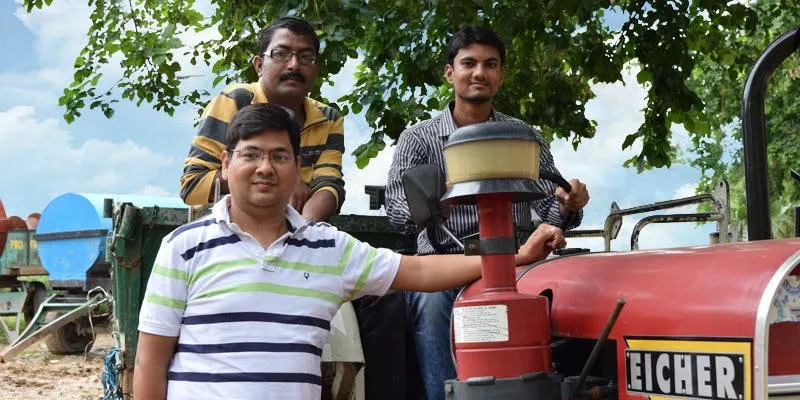
Hence, based on the idea of a sharing economy, Vikas launched Ravgo in May 2016. An agri-equipment rental marketplace for the agriculture sector, it aims to bring access to modern technology for small farmers who cannot afford ownership of expensive machinery.
“Through Ravgo, farmers can access agriculture services, superior farming technologies, and the latest equipment at affordable costs without the hassle of ownership,” Vikas explains.
He adds that the objective is to enhance productivity through farm mechanisation and increase the income of farmers. The platform leverages internet technology to provide benefits of mechanical technology to small and marginal farmers.
6. EM3 Agri Services
After working in the corporate world for 37 years, Rohtash Mal decided to venture into the startup through EM3 Agri Services. The idea for a startup evolved from Rohtash’s stint in the farm equipment industry, which was a high cap-intensive business.
He found that small farmers could barely afford high-cap equipment and often took loans to buy them.

“The idea initially was to help farmers rent equipment. But with time, we realised that an Uber-like model where modern, affordable farm technology services are provided on a pay-per-use basis and on demand works better,” explains Rohtash.
The startup provides farm services for the entire cultivation cycle on a pay-per-use basis. Their central agenda is to increase farmer prosperity by offering accessible and affordable farm mechanisation and agricultural services. They are present in three states: Rajasthan, Uttar Pradesh, and Madhya Pradesh.
7. AgroStar
AgroStar is a Pune-based m-commerce company that sells agricultural inputs directly to farmers. Co-founded by Sitanshu Sheth and Shardul Sheth, AgroStar has a leadership with extensive experience across domains like consulting and retail. The m-commerce platform enables farmers to procure an entire range of agricultural goods by simply giving a missed call on the company’s 1800 number.
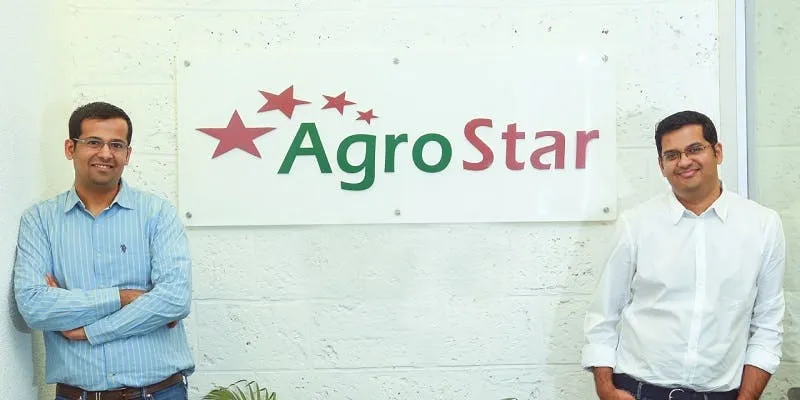
The company has partnered with multiple leading national and multinational brands whose agro products can be bought through AgroStar. Farmers can buy seeds, nutrients, and crop protection, as well as hardware products from the AgroStar platform.
According to Shardul, farmers in India face significant challenges at every point from buying agri-inputs to improving their yields and finally getting a good price for their produce. AgroStar works hard to solve some of these challenges through technology to make farming more sustainable and profitable for farmers.
8. CropIn
CropIn is unleashing the power of the technology, mobile and big data sectors to improve crop traceability and sustainability. This will enable food security and livelihoods for farmers in India and beyond, and create a smarter and safer food supply for consumers around the world.
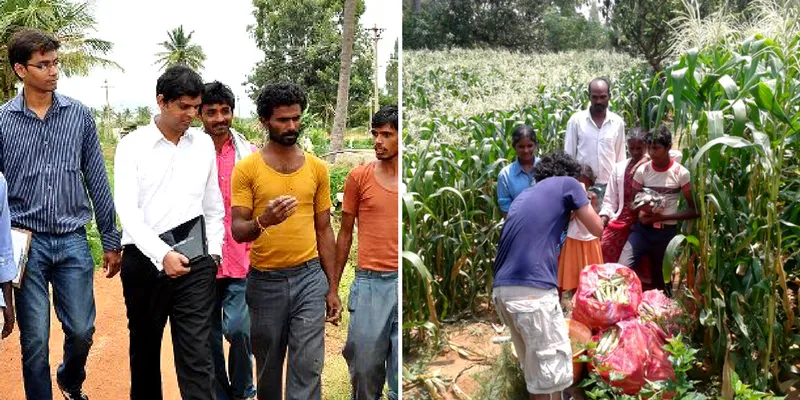
Founded by Krishna Kumar in 2010, CropIn, uses a suite of software and mobile apps powered by GIS and data science to deliver a range of services to not only farmers, but also other entities in the business of agriculture. CropIn has built mobile applications that feed real-time data and advice on practices related to particular crops.
CropIn claims to have digitised 2.1 million acres of land across India, and has a presence in 12 countries with a customer base of 120 clients, including McCain, OCA, and BigBasket.






